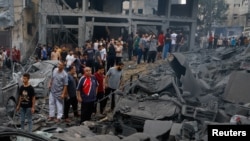Israeli military spokesperson Lt. Col. Richard Hecht told reporters that fighting was still ongoing in seven to eight places in Israel and that it was taking longer than expected to repel the incursion that began Saturday.
Another spokesperson, Lt. Col. Jonathan Conricus, said Israel had called up 100,000 reserve troops.
“Our job is to make sure that at the end of this war, Hamas will no longer have any military capabilities to threaten Israeli civilians with,” Conricus said in a video posted on X. “In addition to that, we are also to make sure that Hamas will not be able to govern the Gaza Strip.”
Conricus said the Hamas attack on Israeli areas bordering the Gaza Strip involved approximately 1,000 militants who entered Israel. The attack has killed 700 civilians and Israeli soldiers and wounded more than 2,100 others.
“It is by far the worst day in Israeli history,” Conricus said.
U.S. Senate Majority Leader Chuck Schumer said at least four Americans were among the dead, and that the toll was expected to rise.
“The viciousness and brutality of this unprecedented attack from Hamas targeting innocent civilians — children, families, seniors — is overwhelming and heart-wrenching,” Schumer said after a briefing from U.S. national security leaders.
The dead in Israel also included people from Britain, France, Nepal, Thailand and Ukraine, officials from those nations said.
Israeli airstrikes in Gaza have hit housing blocks, tunnels, a Hamas intelligence center, a weapons production plant and the homes of Hamas officials. The Palestinian health ministry said 413 Palestinians have been killed.
The United Nations said more than 123,000 people in Gaza have been internally displaced since the fighting began Saturday.
The Israeli government formally declared war against Hamas on Sunday.
“This war will take time. It will be difficult,” Israeli Prime Minister Benjamin Netanyahu said.
Maj. Gen. Ghassan Alian, a key Israel Defense Forces official, said that Hamas had “opened the gates of hell” with its surprise attack and “will bear the responsibility and pay for its deeds."
U.S. Secretary of State Antony Blinken pledged the United States “will continue to work to ensure Israel has what it needs to protect its citizens and to secure the release of hostages.”
U.S. Defense Secretary Lloyd Austin expressed his support in a phone call Sunday with Israeli Defense Minister Yoav Gallant. The Pentagon is sending equipment and munitions to aid Israel and has directed a Navy aircraft carrier to move to the eastern Mediterranean.
Hamas and Israel have fought four wars since Hamas took control of Gaza in 2007.
Israel maintains a blockade around the territory and Netanyahu announced that Israel will cut the electricity, fuel and other goods it supplies to Gaza.
Vivian Nomalanga Bhebhe, a Zimbabwean household laborer working and living in Tel Aviv since 2017, told VOA that people were being told to stay inside as Israeli troops worked to locate militants.
Bhebhe said with Israeli operations in Gaza expected, as well as resulting Hamas retaliation, “it's going be a difficult week for all of us here because we don't know what we expect.”
During past conflicts between Israel and Palestinian militants, Egypt has often played a key role in mediating an end to the fighting.
Other countries have influence in the region as well, but Chang Teng-chi, chairperson of Political Science Department at Taiwan University, specializing in Chinese diplomacy, told VOA that while China has strong relations with Israel, its lack of connection with the other side of the conflict means it “may be difficult for China to play a mediating role.”
“China's main dealings are limited to the Palestinian Authority, and it has no deep relationship with Hamas,” Chang said.
Meanwhile, the Israeli army exchanged fire Sunday with Hezbollah militants on the Lebanese border, opening up the possibility of a broader conflict, although Blinken said fighting there had quieted.
Lebanon and Israel are considered enemy states, but a 2006 truce between them has held, for the most part with occasional small rocket attacks from Lebanon which Israel has addressed with retaliatory attacks.
Some information for this story came from The Associated Press, Agence France-Presse and Reuters











